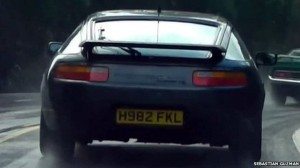Over the Top (Gear)
As one of the BBC’s biggest television series, with a weekly worldwide audience of around 350 million people in 170 different countries, it’s not surprising that Top Gear’s quintessentially and traditionally British brand of humour causes offence on occasion.
In recent weeks, the show was hounded out of Argentina after attention was drawn to a license plate on one of the cars used for filming, which read ‘H982 FKL’ allegedly a reference to the Falklands war which took place in 1982. The plate sparked a mob to form outside the crew’s hotel, pelting official cars with stones and prompting the BBC to evacuate all three of its presenters. The creative force behind Top Gear- producer Andy Wilman and main presenter Jeremy Clarkson- vehemently denied any intentional joke, citing coincidence, but considering the show’s previous record with this kind of humour, their word is hard to believe.
During a trip to America in 2007, the three presenters caused controversy when a seemingly immature challenge quickly escalated into a serious incident. The aim was for each presenter to attempt to paint as offensive a slogan as possible on the others car: among those picked were “Man love rules Ok”, “Country and Western is rubbish” and “Nascar sucks”. Unsurprisingly, the residents of Alabama didn’t take kindly to these sentiments and as the crew pulled into a local gas station, the owner took particular exception to their messages. After a few minutes, a truck full of men armed with bats pulled up and three of television’s biggest stars of the future were being pelted with stones and had to run, possibly for their lives. It was an incident that foreshadowed the show’s future, but one that went relatively unnoticed at the time, since it occurred before Richard Hammond’s 300 mph crash launched the show into global notoriety.
In the Vietnam special too, the punishment if one of the presenter’s motorcycles broke down was a replacement painted in stars and stripes blasting out Bruce Springsteen’s ‘Born in the USA’. In a relatively peaceful country, there were no repercussions, but it strikes a suspicious parallel with the license plate which the Argentinian government has now demanded an apology from the BBC for.
Jeremy Clarkson, the face of the show, is never far from controversy having attracting widespread attention with various comments, some more justifiably than others. His notorious feud with Piers Morgan, after the then-editor of The Mirror printed pictures of him with an alleged mistress, means that Clarkson is a prime target for many media publications, resulting in a lot of unfair treatment. During an appearance on the One Show, Clarkson voiced his support of a recent strike, before adding tongue-in-cheek: “but we have to balance it don’t we, because this is the BBC: frankly I’d have them all shot”. Clarkson’s profession was entirely satirical, and yet the tabloid media selectively excluded the lead up to his final remarks, starting a misinformed witch hunt. It would be excessive to say that Clarkson is entirely innocent, but the mentality of those wishing to tar his name with the same brush as the likes of Nigel Farage, upsets me as a long term fan of the show.
One only needs to read Clarkson’s writing in the Sunday Times to realise he is not the mindless, car-junkie he perpetuates himself to be. He is in fact an incredibly intelligent and thoughtful man with an admittedly questionable sense of humour. In this case it is clear that Top Gear overstepped the mark with their decision to poke fun at a war which many Argentinian’s will actually remember, but in general I think the show is a great achievement for Britain. The editing, cinematography and script writing are all excellent: in an age of dumbed down television shows like ‘the X-Factor’, ‘Top Gear’ addresses big issues and educates, as can be seen with the popular Botswana special, and the ending of the American adventure which saw the team give their cars to people who had lost their lives to Hurricane Katrina for no cost at all.
Questions remain over where the show will go from here, as even the most diehard fan would admit its glory days are past, especially with mounting environmental and social concerns around high priced supercars. Ultimately Top Gear is far from the most politically correct show on tv, and one that rightly has its critics, but I would stress more than anything it has to be watched and should not be written off as a mindless exploration into bloke-ish mentality.


Comments